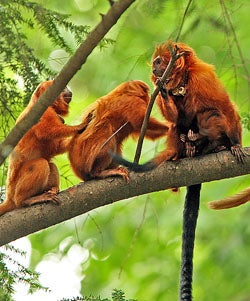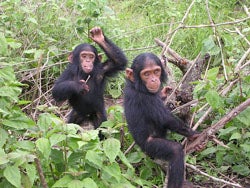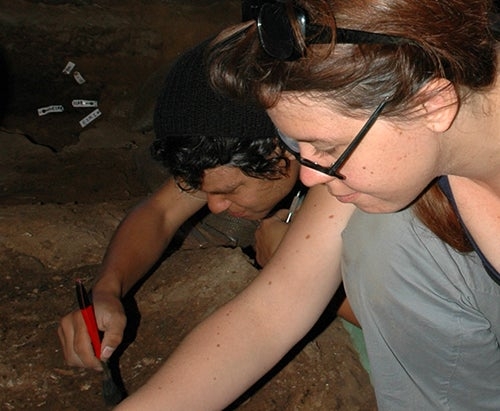
Primate kids
A young chimp watches how his mom cracks nuts. She grabs a rock. He grabs rock. She takes a nut. He takes a nut. She carefully cracks open the nut to get the treat inside. He tries stepping on it.
It will be a while before this young chimp learns how to crack nuts on his own. He has lots of time to practice, though. Big brains take a lot of time and energy to develop. Youth is also the time for primates to learn useful skills for surviving as adults.
Primate babysitters
 Most primate mothers only have one kid at a time. Caring for just one primate kid is still really hard. A new mom has to find enough food to feed herself and her infant. She also has to carry her kid around and keep it safe from predators.
Most primate mothers only have one kid at a time. Caring for just one primate kid is still really hard. A new mom has to find enough food to feed herself and her infant. She also has to carry her kid around and keep it safe from predators.
Sometimes other individuals will act as “allomothers,” sort of like primate babysitters that act as the mom. Allomothers might be fathers, brothers, sisters, or even unrelated females. These allomothers help feed and carry primate kids. They help give mom a break so she can recover her energy faster.
Why do unrelated primates take care of other kids? Young females like to practice their mom skills before they have their own kids. That way, they will be better prepared to care for them.
Monkeying around
 Play is one of the most important things for a young primate. Through play, primate kids learn how to behave as adults. This is important for social primates that need to learn how to fit into their group.
Play is one of the most important things for a young primate. Through play, primate kids learn how to behave as adults. This is important for social primates that need to learn how to fit into their group.
Young monkeys and apes learn to recognize individuals. They need to know what different sounds and facial expressions mean. Primate kids also need to practice fighting. One day, they will need to defend their territory or warn off predators.
Be Part of
Ask An Anthropologist
By volunteering, or simply sending us feedback on the site. Scientists, teachers, writers, illustrators, and translators are all important to the program. If you are interested in helping with the website we have a volunteers page to get the process started.

